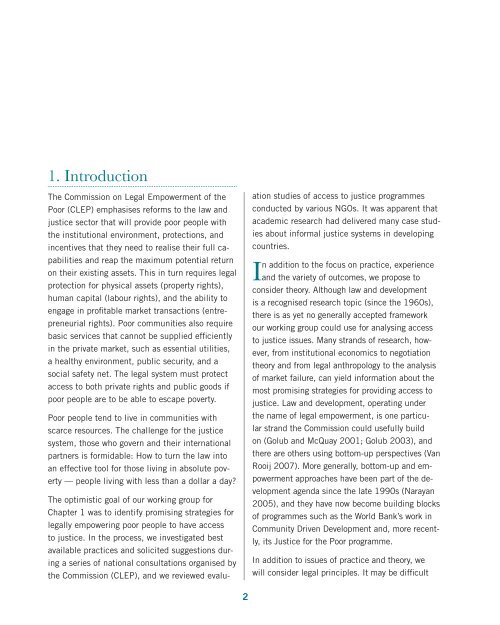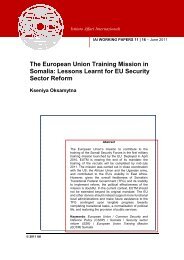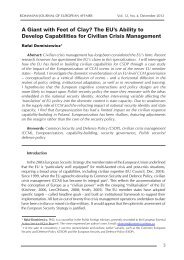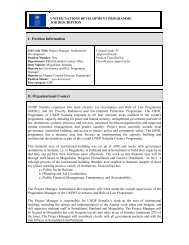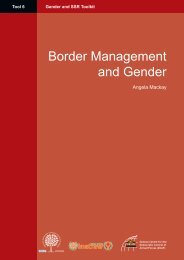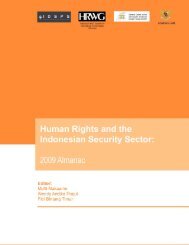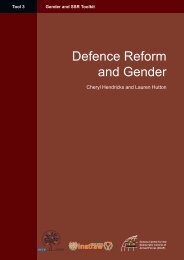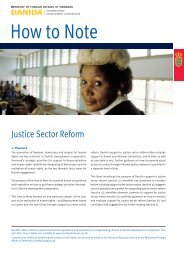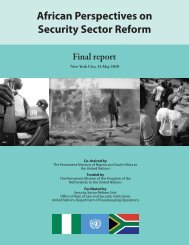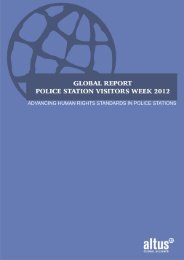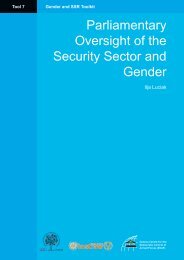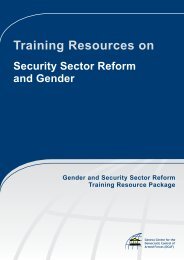Making The Law Work for Everyone Commission on Legal ... - ISSAT
Making The Law Work for Everyone Commission on Legal ... - ISSAT
Making The Law Work for Everyone Commission on Legal ... - ISSAT
Create successful ePaper yourself
Turn your PDF publications into a flip-book with our unique Google optimized e-Paper software.
1. Introducti<strong>on</strong><str<strong>on</strong>g>The</str<strong>on</strong>g> <str<strong>on</strong>g>Commissi<strong>on</strong></str<strong>on</strong>g> <strong>on</strong> <strong>Legal</strong> Empowerment of thePoor (CLEP) emphasises re<str<strong>on</strong>g>for</str<strong>on</strong>g>ms to the law andjustice sector that will provide poor people withthe instituti<strong>on</strong>al envir<strong>on</strong>ment, protecti<strong>on</strong>s, andincentives that they need to realise their full capabilitiesand reap the maximum potential return<strong>on</strong> their existing assets. This in turn requires legalprotecti<strong>on</strong> <str<strong>on</strong>g>for</str<strong>on</strong>g> physical assets (property rights),human capital (labour rights), and the ability toengage in profitable market transacti<strong>on</strong>s (entrepreneurialrights). Poor communities also requirebasic services that cannot be supplied efficientlyin the private market, such as essential utilities,a healthy envir<strong>on</strong>ment, public security, and asocial safety net. <str<strong>on</strong>g>The</str<strong>on</strong>g> legal system must protectaccess to both private rights and public goods ifpoor people are to be able to escape poverty.Poor people tend to live in communities withscarce resources. <str<strong>on</strong>g>The</str<strong>on</strong>g> challenge <str<strong>on</strong>g>for</str<strong>on</strong>g> the justicesystem, those who govern and their internati<strong>on</strong>alpartners is <str<strong>on</strong>g>for</str<strong>on</strong>g>midable: How to turn the law intoan effective tool <str<strong>on</strong>g>for</str<strong>on</strong>g> those living in absolute poverty— people living with less than a dollar a day?<str<strong>on</strong>g>The</str<strong>on</strong>g> optimistic goal of our working group <str<strong>on</strong>g>for</str<strong>on</strong>g>Chapter 1 was to identify promising strategies <str<strong>on</strong>g>for</str<strong>on</strong>g>legally empowering poor people to have accessto justice. In the process, we investigated bestavailable practices and solicited suggesti<strong>on</strong>s duringa series of nati<strong>on</strong>al c<strong>on</strong>sultati<strong>on</strong>s organised bythe <str<strong>on</strong>g>Commissi<strong>on</strong></str<strong>on</strong>g> (CLEP), and we reviewed evaluati<strong>on</strong>studies of access to justice programmesc<strong>on</strong>ducted by various NGOs. It was apparent thatacademic research had delivered many case studiesabout in<str<strong>on</strong>g>for</str<strong>on</strong>g>mal justice systems in developingcountries.In additi<strong>on</strong> to the focus <strong>on</strong> practice, experienceand the variety of outcomes, we propose toc<strong>on</strong>sider theory. Although law and developmentis a recognised research topic (since the 1960s),there is as yet no generally accepted frameworkour working group could use <str<strong>on</strong>g>for</str<strong>on</strong>g> analysing accessto justice issues. Many strands of research, however,from instituti<strong>on</strong>al ec<strong>on</strong>omics to negotiati<strong>on</strong>theory and from legal anthropology to the analysisof market failure, can yield in<str<strong>on</strong>g>for</str<strong>on</strong>g>mati<strong>on</strong> about themost promising strategies <str<strong>on</strong>g>for</str<strong>on</strong>g> providing access tojustice. <str<strong>on</strong>g>Law</str<strong>on</strong>g> and development, operating underthe name of legal empowerment, is <strong>on</strong>e particularstrand the <str<strong>on</strong>g>Commissi<strong>on</strong></str<strong>on</strong>g> could usefully build<strong>on</strong> (Golub and McQuay 2001; Golub 2003), andthere are others using bottom-up perspectives (VanRooij 2007). More generally, bottom-up and empowermentapproaches have been part of the developmentagenda since the late 1990s (Narayan2005), and they have now become building blocksof programmes such as the World Bank’s work inCommunity Driven Development and, more recently,its Justice <str<strong>on</strong>g>for</str<strong>on</strong>g> the Poor programme.In additi<strong>on</strong> to issues of practice and theory, wewill c<strong>on</strong>sider legal principles. It may be difficult2


